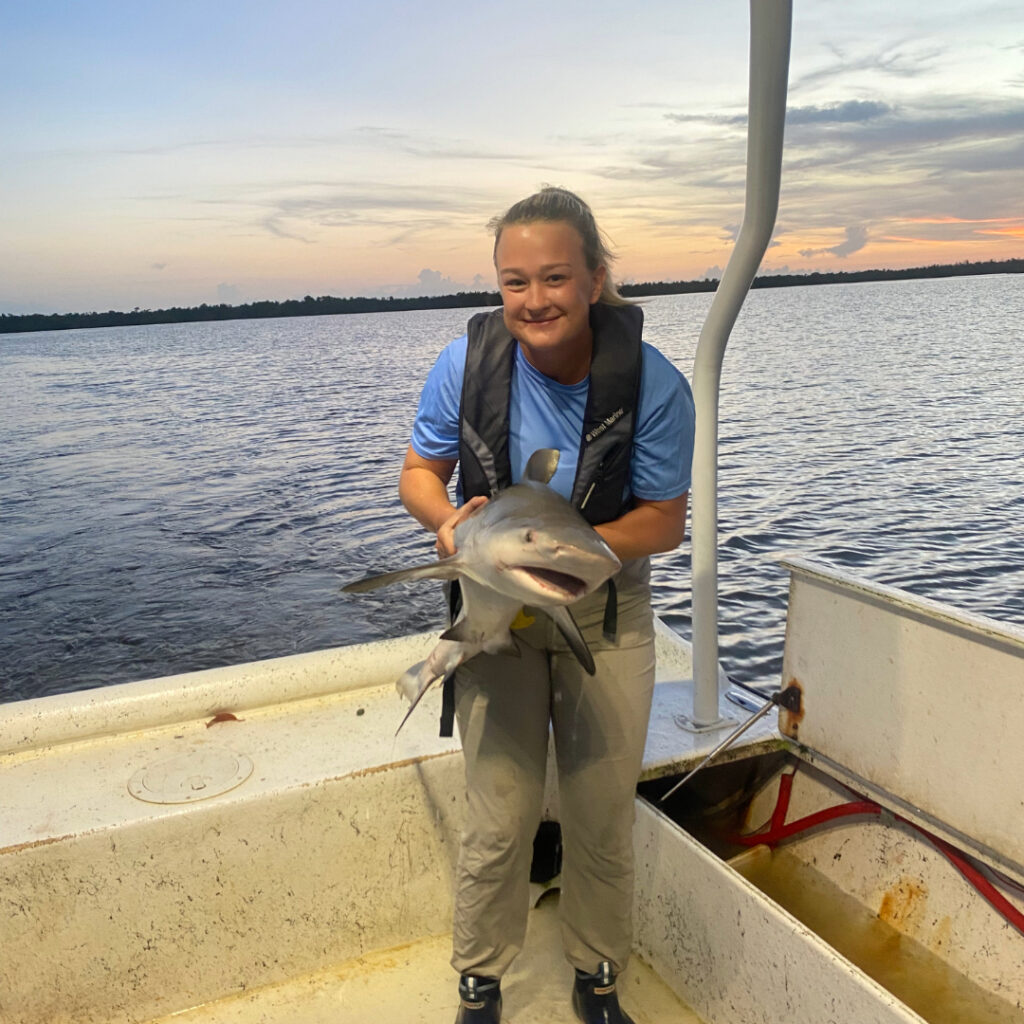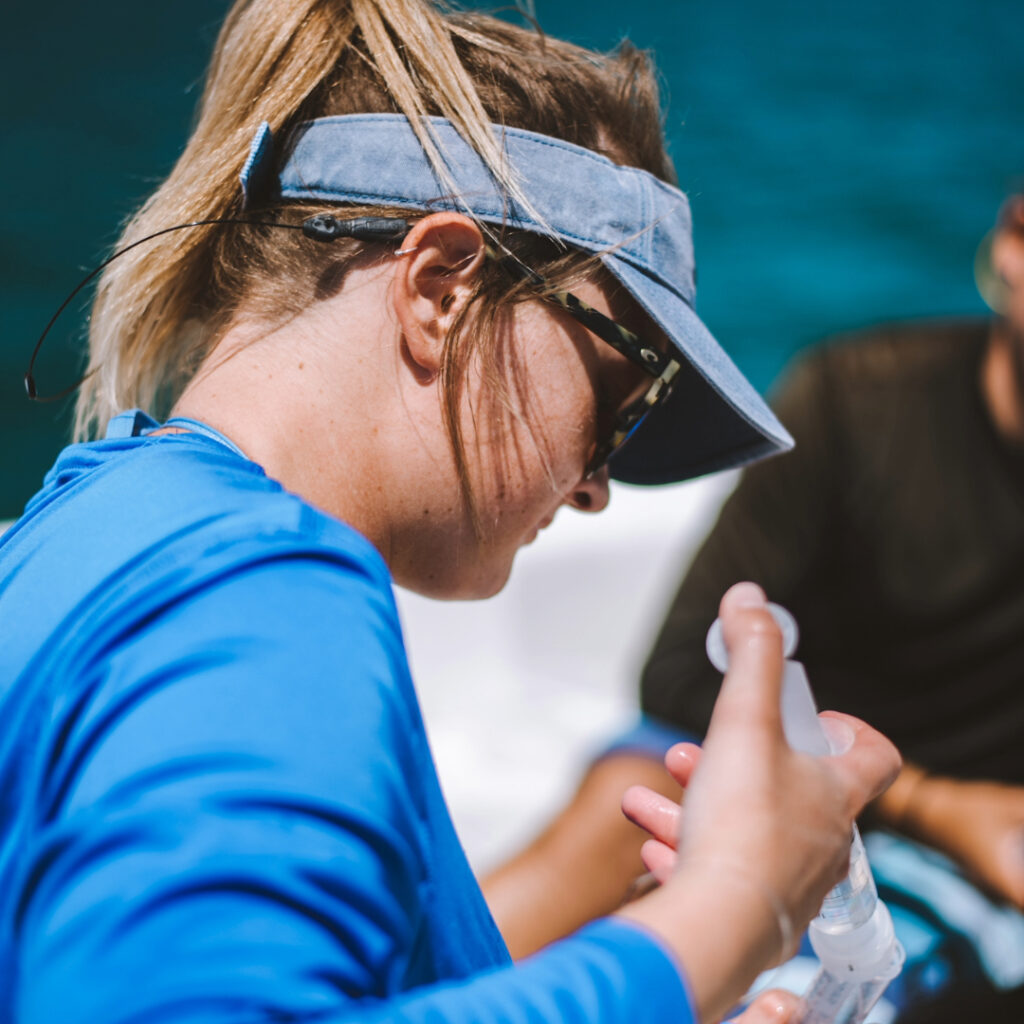Susannah Cogburn is a Master of Environmental Science student at Florida Gulf Coast University, where she studies the effects of chemical contaminants on bull shark physiology and their implications for Florida’s marine ecosystems. She was awarded the Florida Sea Grant Guy Harvey Fellowship in 2024.

Susannah holding a Bull Shark in Pumpkin Bay.
When I think back to my earliest memories of the ocean, I can almost feel the sand between my toes and hear the gentle crash of waves breaking against the shore. I grew up in Pensacola, just minutes from the water, where my fascination with the ocean shaped my path toward a career in marine science.
Bull Sharks (Carcharhinus leucas) are an important species in Florida’s coastal and estuarine ecosystems, and a top predator that plays a vital role in marine food webs. However, their habitats – such as rivers, estuaries, and coastal zones – overlap with areas of high human activity and contamination.
My work focuses on a hidden but growing concern: chemical contaminants. Understanding the types of contaminants and its effects in bull sharks is not just about protecting a single species — it’s about preserving the health and resilience of Florida’s entire marine ecosystem.
Why Study Bull Sharks?
Bull sharks are unique among sharks for their ability to tolerate fresh, brackish, and saltwater environments, allowing them to thrive in Florida’s rivers, estuaries, and coastal waters. This adaptability makes them a valuable species to study because they can encounter a variety of pollutants as they move between habitats. Unlike other shark species, bull sharks frequently occupy estuaries near populated areas where agricultural runoff, wastewater, and anthropogenic discharge accumulates. By studying the presence and effects of these chemicals in bull sharks, we gain insight into the health of our water systems and the challenges facing other species that share these waters.
My research, which involves sampling bull sharks from different areas in Southwest Florida, helps us monitor contaminant levels over time. Each tissue sample tells a story of what bull sharks encounter as they move through ecosystems. Understanding these chemical accumulations helps scientists and environmental managers make informed decisions that affect not only marine life, but also the coastal communities that rely on these waters for recreation, fishing, and tourism.

Susannah filtering water for further analysis. Photo by Alex Donnenfeld.
The Threat of Chemical Contaminants in Florida’s Marine Ecosystem and Communities
Chemical contaminants can enter marine environments through various sources, including agricultural runoff, industrial discharge, and urban wastewater. Contaminants do not just affect bull sharks at the top of the food web; they impact the entire ecosystem, providing insight into the state of the marine food web, as top predators accumulate toxins from their prey. Contamination can also affect the survival and reproductive success of bull sharks, which is concerning for the overall health of Florida’s marine ecosystems.
Florida’s waters support not only rich marine biodiversity but also a thriving economy based on tourism, fishing, and recreational water activities. Chemical contamination in bull sharks is an early warning sign of broader ecosystem health risks, which can cascade down to fish species targeted in commercial and recreational fishing. Detecting these contaminants in bull sharks alerts potential risks for human consumers and the need for stricter environmental protection measures.
Through my research, I aim to raise awareness about the interconnectedness of these issues. Contaminants in marine predators like bull sharks impact everything from local economies and food security to community health. By tracking contaminant levels in bull sharks, we can better understand the sources and impacts of pollution in Florida’s critical estuaries.
What’s Next for Bull Shark Conservation?
My research is just one piece of a larger puzzle. The presence of these chemical contaminants raises important questions about Florida’s environmental practices and the future of our waters. To address these issues, we need an interdisciplinary approach that combines research, policy, and community engagement.
One of my goals as a researcher is to make my findings accessible to my community. Educating the public about the effects of contaminants and the role of apex predators like bull sharks is essential for creating long-term positive change. The more we know, the better we are equipped to make choices that benefit our environment and communities. As I continue my research, I’m grateful for the support of the Florida Sea Grant and the opportunity to contribute to a greater understanding of Florida’s marine ecosystems.